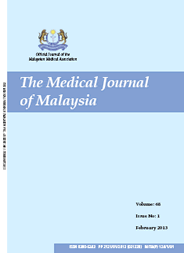MJM, Vol 70 Supplement 1 September 2015
Psychometric properties of the Malay version of
Knee injury and Osteoarthritis Outcome Score (KOOS) among knee osteoarthritis
patients in Malaysia: A confirmatory analysis
*Department of Family Medicine, Universiti Sains Malaysia, Kelantan, **Klinik Kesihatan Cheneh, Kemaman, Terengganu, ***Department of Orthopaedic, Universiti Sains Malaysia, Kelantan
ABSTRACT
Introduction: The aim of this study is to cross-culturally adapt Malay version of Knee injury and Osteoarthritis Outcome Score (KOOS) and to evaluate its psychometric properties in patients with knee osteoarthritis (OA).
Methods: A cross-sectional study was conducted involving 226 knee osteoarthritis patients attending Outpatient and Orthopaedic Clinics, Universiti Sains Malaysia Hospital between September 2013 and March 2014. The English version KOOS was translated into Malay version using forward and backward translation process, followed by face validity and content validity. Construct validity and internal consistency assessment were performed. The data were analysed using SPSS version 20 and Analysis of Moment Structure version 21.0. Confirmatory analysis, and reliability analysis were performed to evaluate the psychometric properties of the KOOS Malay version questionnaire.
Results: The results showed that the original five-factor model with 42 items failed to achieve acceptable values of the goodness of fit indices, indicating poor model fit. A new five-factor model of 26 items demonstrated acceptable level of goodness of fit (comparative fit index= 0.929, incremental fit index= 0.930, Tucker Lewis fit index= 0.92, root mean square error of approximation= 0.073 and Chi-squared/degree of freedom= 2.183) indices to signify a model fit. The Cronbach’s alpha value for the new model ranged from 0.776 to 0.946. The composite reliability values of each construct ranged between 0.819 and 0.921, indicating satisfactory to high level of convergent validity.
Conclusion: The five-factor model with 26 item Malay version of KOOS questionnaire demonstrated a good degree of goodness of fit and was found to be valid, reliable and simple as an assessment tools for symptoms, pain, activity of daily living, sports and recreational activity and quality of life for Malaysian adults suffering from knee osteoarthritis.
